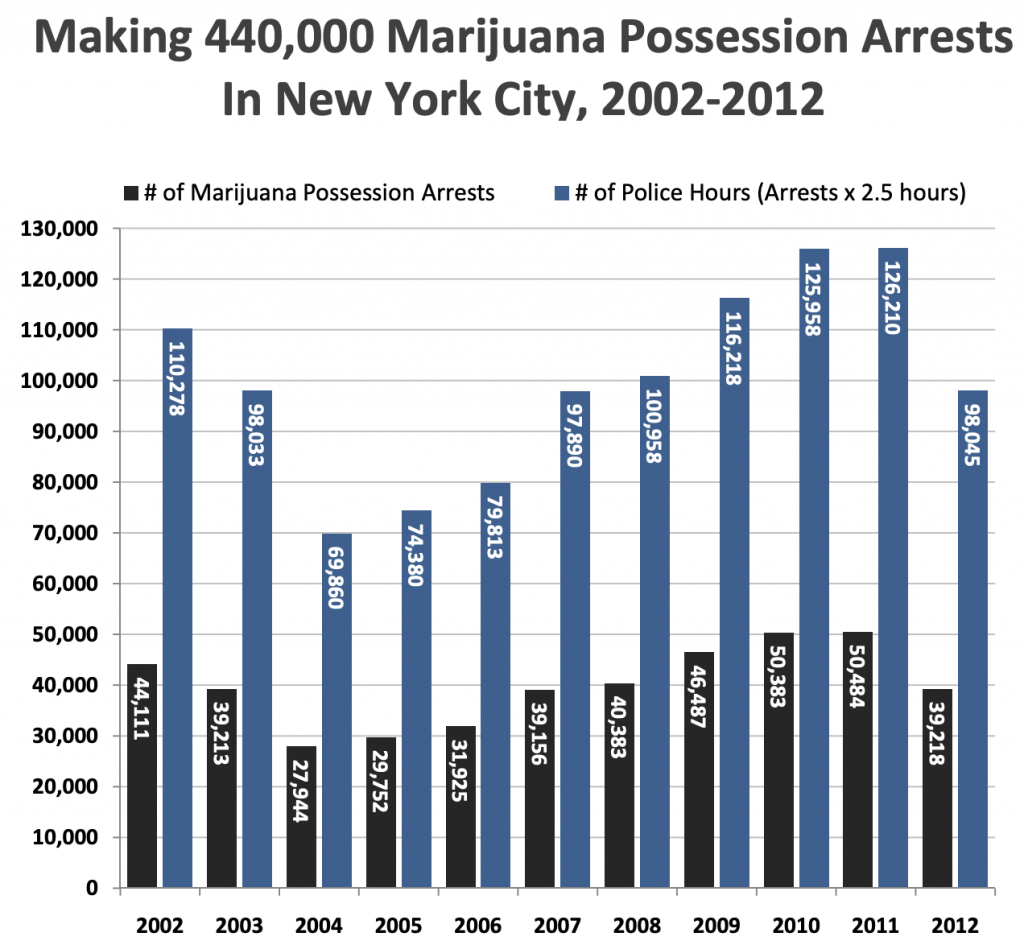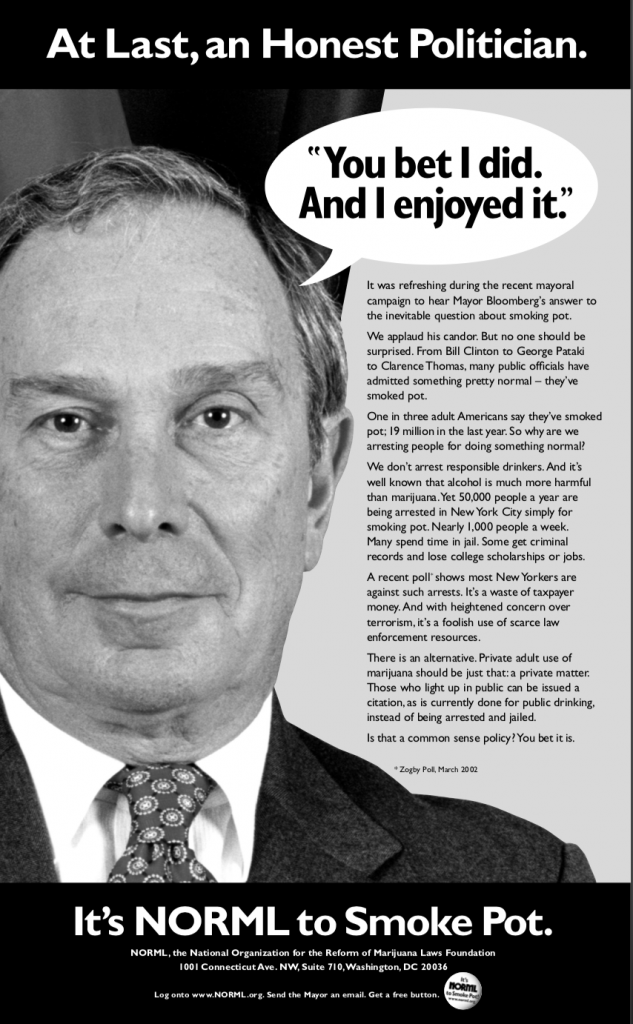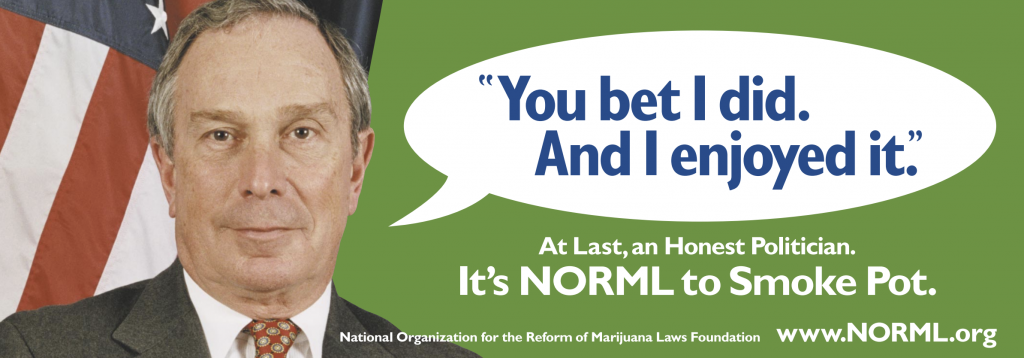 https://cannabisexaminers.com/wp-content/uploads/2019/11/Screen-Shot-2019-11-27-at-7.53.43-PM-e1574913287550-1000x600.png
https://cannabisexaminers.com/wp-content/uploads/2019/11/Screen-Shot-2019-11-27-at-7.53.43-PM-e1574913287550-1000x600.png
Former New York City Mayor Michael Bloomberg launched a late bid for the 2020 Democratic presidential nomination on November 24.
The billionaire candidate, who runs the news and financial data company Bloomberg LP, is making the case that he’s best positioned to defeat President Trump in the 2020 election. Bloomberg has a long history of speaking out against marijuana law reform, and his record on discriminatory policing tactics as mayor has given advocates pause about his candidacy.
Bloomberg not only opposes legalization—putting him in a category of current candidates that includes only former Vice President Joe Biden—but called the policy change the “stupidest thing anybody has ever done.”
Here’s a closer look at where the former mayor stands on drug policy.
Legislation And Policy Actions
Bloomberg served three terms as mayor of New York City, beginning in 2002. While he changed parties throughout that time, one consistent factor under his administration was a high level of arrests for marijuana possession.
From 2002 to 2012, the NYPD made about 440,000 arrests for cannabis possession alone, collectively spending about one million hours processing those cases, according to a report from the Drug Policy Alliance (DPA). Overall, there were more marijuana arrests under Bloomberg than under the mayorships of Ed Koch, David Dinkins and Rudy Giuliani combined.

Via DPA.
DPA paid particularly close attention to cannabis policy under Bloomberg, releasing reports year-over-year on arrest data, which peaked in 2011 despite the state having decriminalized low-level possession in the 1970s. The group also highlighted consistent racial disparities in cannabis arrests in the city.
The high volume of arrests prompted City Council members and activists to rally outside of Bloomberg’s home in 2011, demanding an end to the aggressive enforcement.
Bloomberg came out against a 2011 state bill, introduced by then-Assemblyman Hakeem Jeffries (D) and Sen. Mark Grisanti (R), that sought to make possession of 25 grams or less of cannabis punishable by a court summons and fine rather than jail time.
“This would encourage smoking in the streets and in our parks, reversing successful efforts to clean up neighborhoods and eliminate the open-air drug markets like we used to find in Washington Square Park,” a mayoral aide told The New York Times. “Hot-spot policing that focuses on the most violent neighborhoods has led to dramatic reductions in violent crime. Marijuana arrests can be an effective tool for suppressing the expansion of street-level drug markets and the corresponding violence.”
The aide also said that concerns about the impact of a possession conviction on a young person’s record are overblown.
“They are not saddled with criminal records because those records are sealed,” he said, adding that there are restrictions on what employers can ask about prior convictions.
The next year, Bloomberg voiced support for a modest reform proposal that called for an end to arrests of people for possessing cannabis in public view, which advocates argued often stemmed from unlawful searches. The measure faced resistance from Senate Republicans, however.
During his State Of the City address in 2013, the mayor said he supported New York Gov. Andrew Cuomo’s (D) proposal to make cannabis possession a violation rather than a misdemeanor.
“We know that there’s more we can do to keep New Yorkers, particularly young men, from ending up with a criminal record,” he said.
He also said the city “won’t wait for that to happen” and announced that people arrested for low-level possession in New York City would no longer be held overnight if they presented an ID and passed a warrant check.
“It’s consistent with the law, it’s the right thing to do and it will allow us to target police resources where they’re needed most,” he said.
Throughout Bloomberg’s terms, he faced sharp criticism over the police department’s widespread use of a controversial stop-and-frisk policy, whereby officers frequently detained people—the majority of cases involving people of color—and searched them. Weapons were rarely produced in these searches.
In 2013, the mayor vetoed two policing reform bills that were meant to cut down on police misconduct and rein in instances of stop-and-frisk. The first gave the inspector general subpoena power to study policing encounters and make policy recommendations, and the other allowed state courts to take up claims of “bias-based policing” and broadened the scope of offenses that could be litigated.
“Some of these things are life and death issues, like these two horrendous bills in the City Council and they’re going to put our police officers at risk and they’re going to put the public at risk and I’ve got an obligation to tell people that,” the mayor argued.
The City Council later overrode Bloomberg’s actions, however.
Before local lawmakers stepped in, Bloomberg ignited controversy after doubling down on his opposition to the reform proposals by stating, “I think we disproportionately stop whites too much and minorities too little. It’s exactly the reverse of what they say.”
Yes, he said it! This is Bloomberg defending his racist stop-and-frisk. When I posted this quote the other day some commenters couldn’t believe he said it. This is a video-as-proof culture. Well, here’s your video… pic.twitter.com/MdBdrcs4DY
— Charles M. Blow (@CharlesMBlow) November 26, 2019
Quotes And Social Media Posts
Bloomberg has made it patently clear that he’s no fan marijuana legalization, repeatedly making dismissive comments about both the policy and cannabis consumers themselves.
In January 2019, as most candidates were gearing up to propose bold drug policy reform plans, the former mayor said that rising rates of drug overdose deaths, which were primarily linked to opioids, demonstrated why marijuana shouldn’t be legal.
“Today incidentally, we are trying to legalize another addictive narcotic,” he said, referring to cannabis, “which is perhaps the stupidest thing anybody has ever done. We’ve got to fight that, and that’s another thing that Bloomberg Philanthropies will work on it in public health.”
While speaking at Annapolis, former New York Mayor Michael Bloomberg also blasted efforts to legalize marijuana, calling it “perhaps the stupidest thing we’ve ever done.” pic.twitter.com/dN5sdJdYBt
— DJ Judd (@DJJudd) January 23, 2019
He made similar comments the week prior during a speech at the University of Toronto, arguing that ending prohibition at the national and local levels “doesn’t make any sense at all.”
“To go and encourage people—to make it easier for people to engage in a behavior that has a significant possibility of damaging people’s health—is just nonsensical,” he said. “This mad, passionate rush to let everybody do things without any research just isn’t something we would do in any other way.”
Bloomberg said in 2013 that he doesn’t support cannabis legalization because THC potency has increased and because he thinks drug dealers would simply move on to selling other illicit products such as cocaine.
Three days before a 2013 New York state legislature vote to allow medical cannabis for individuals suffering from debilitating medical conditions such as cancer, HIV/AIDS and multiple sclerosis, Bloomberg made dismissive comments about marijuana’s therapeutic value.
“Yeah, right, medical, my foot,” he said. “Come on. There’s no medical—this is one of the great hoaxes of all times.”
He said in 2002 that the problem with legalizing cannabis for medical purposes is that it represents a “slippery slope” and that “using drugs is probably a terrible idea, from where it goes, and I am very much in favor of enforcing laws on the books.”
“I do not think that decriminalizing marijuana is a good idea,” he said.
”I’ve always thought if we don’t want to enforce laws on the books, we should remove them from the books. But when you have laws, you breed contempt if you don’t enforce them,” he said. ”And I’ve listened to a lot of people over the years discuss the decriminalization of some narcotics, particularly marijuana, and on balance, I would side with those that think it’s a bad idea.”
Bloomberg revealed the extent of his hostility to drugs in 2012 when he seemed to sympathize with Singapore’s use of the death penalty against people who sell drugs.
“In lots of places in the Far East, they have signs up, ‘Death to drug dealers,’” he said. “Think about the number of people who die from drug use here in this country. And yet we don’t take it seriously enough to dissuade people… Executing a handful of people saves thousands and thousands of lives.”
He added that he wasn’t necessarily endorsing extrajudicial killings of drug traffickers because such policies “don’t fit our definition of democracy.”
“I’m not suggesting we go kill ’em. But when you talk to people overseas, they can’t understand why we allow people to deal in drugs [that] are killing people,” he said. “The focus that they do have on protecting their people is something that we should think long and hard about.”
He also voiced skepticism about ending prohibition in that interview, stating that it’s “intriguing, but I don’t quite think I’ve ever quite gotten there, to support the legalization of drugs.”
In 2015, the former mayor peddled a debunked theory about cannabis use decreasing people’s IQ.
“What are we going to say in 10 years when we see all these kids whose IQs are 5 and 10 points lower than they would have been?” he said of efforts to legalize marijuana. “I couldn’t feel more strongly about it, and my girlfriend says it’s no different than alcohol. It is different than alcohol. This is one of the stupider things that’s happening across our country.”
On his support for stop-and-frisk policing, Bloomberg had been largely unapologetic up until just before launching his presidential bid. After a federal court ruled in 2013 that the policy was discriminatory and mandated a change, the then-mayor held a press conference where he defended the tactic, arguing that it’s “saved lives” and helped reduce incarceration rates.
“We are the poster child that everybody wants to follow,” he said, adding that police “go to where the reports of crime are” and those places “unfortunately happen to be poor neighborhoods and minority neighborhoods.”
Bloomberg apologized for the discriminatory policy days before announcing his candidacy for president.
“I can’t change history,” Bloomberg said. “However today, I want you to know that I realize back then I was wrong.”
Recently, the billionaire has invested his resources into another battle that’s generated pushback from reform advocates. He’s taken a strong stance in favor of bans on flavored vaping products—a position that advocates worry will encourage more people to obtain potentially dangerous products from the illicit market and also risk having former cigarette smokers return to the combustable form.
If President Trump won’t take steps to protect our children, then we need someone in the office who will. https://t.co/gLIZzfdXEI pic.twitter.com/q8FvZYuvQu
— Mike Bloomberg (@MikeBloomberg) November 18, 2019
“Ten weeks ago, President Trump said he would ban flavored e-cigarettes that are causing an e-cigarette epidemic among children,” Bloomberg said in November 2019. “Today we learned that he walked away from his commitment and caved to tobacco lobbyists. American families deserve better. If President Trump won’t take steps to protect our children, then we need someone in the office who will.”
Personal Experience With Marijuana
While it may come as a surprise given his record on marijuana criminalization and dismissive comments about consumers, Bloomberg is among the many Americans who have tried cannabis.
One year before launching his mayoral bid, Bloomberg was asked by New York Magazine whether he’s used marijuana and he responded, “You bet I did—and I enjoyed it.” The comment was used in an advertisement that the advocacy group NORML later took out in The New York Times and on buses.

Via NORML.
He said in 2002 that he regretted making the comment, even though he acknowledged that “what I said back then was the truth.”
”In terms of, I had, certainly when I was younger, as I suppose most people in my generation, experimented. I never lie, so if somebody asked me a question, I told them,” he said. “Do I, in retrospect, wish I didn’t say it that day so they couldn’t quote it? Of course.”

Via NORML.
Marijuana Under A Bloomberg Presidency
At a time when marijuana reform has become a bipartisan issue that’s advancing even in Congress, when all but one other Democratic candidate backs broad legalization and when a majority of states have legalized cannabis in one form or another, Bloomberg stands out as a vocal opponent of the reform movement.
And unlike Biden, who helped write some of the punitive anti-drug laws that advocates have worked for decades to reform and remains opposed to adult-use legalization, Bloomberg has so far given no indication that he’s evolved on the issue to back even modest reforms. While it’s possible that the candidate will be encouraged to lay out an updated position as the topic is raised on the campaign trail, it does not seem likely at this point that he would support efforts to change federal marijuana laws and may in fact obstruct such efforts if elected to the Oval Office.
Where Presidential Candidate Deval Patrick Stands On Marijuana


